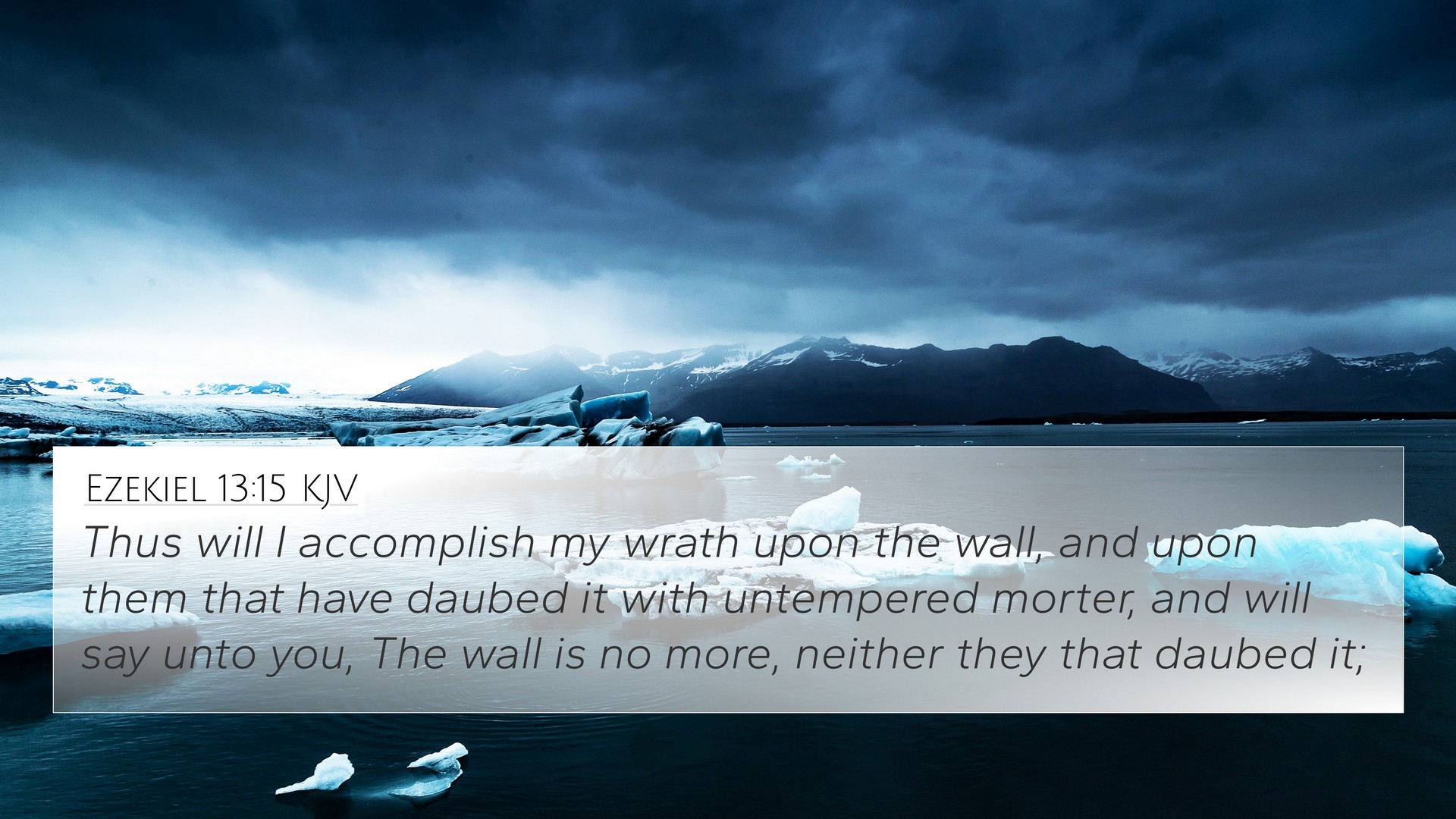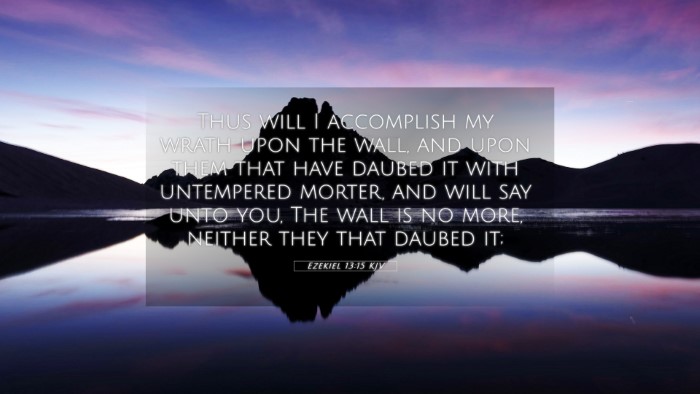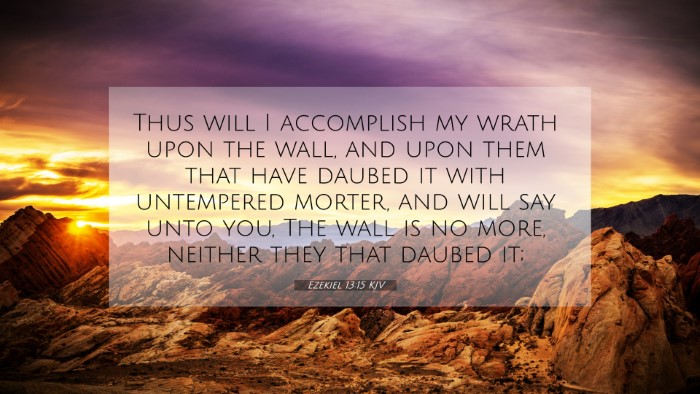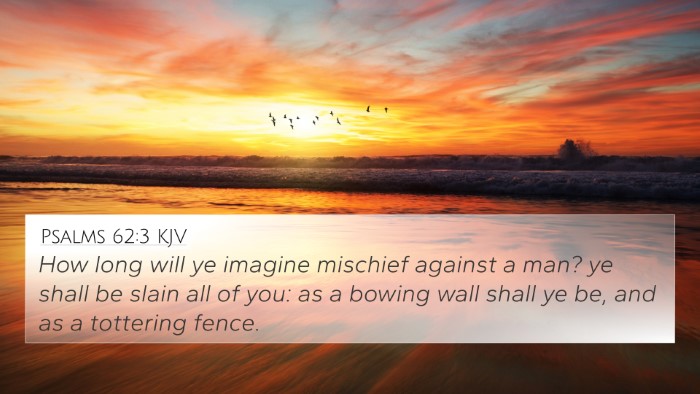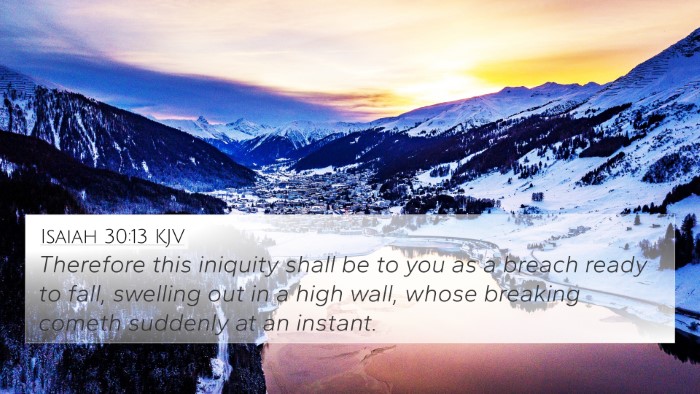Ezekiel 13:15 - Summary and Interpretation
Bible Verse: Ezekiel 13:15
This verse states, “So will I accomplish My wrath on the wall and on those who have plastered it with untempered mortar; and I will say to you, 'The wall is no more, nor those who plastered it...'
Meaning and Interpretation
The verse from Ezekiel 13:15 offers profound insight into God's judgment and the futility of false prophecies. It symbolizes the destruction that awaits those who mislead others through empty words and deceptive teachings. The “wall” represents the façade of security offered by these false prophets.
Commentaries from respected biblical scholars highlight various aspects of this verse:
Insights from Public Domain Commentaries
- Matthew Henry: He emphasizes that God’s judgment will fall on not only the false prophets who mislead His people but also on the structures (like the wall) they create to give false security. This underscores the theme of divine retribution against deceit.
- Albert Barnes: Barnes notes that the “untempered mortar” symbolizes the ineffective and unreliable teachings of these prophets. It suggests that true security comes from God alone, not from human constructs or false promises.
- Adam Clarke: Clarke provides an in-depth examination of the imagery, explaining that the wall represents the protection or safety that false prophets claim to provide. In reality, without the true foundation of God’s word, such security is nonexistent and will ultimately collapse.
Cross-References Related to Ezekiel 13:15
Understanding Ezekiel 13:15 also involves examining related scripture. Here are several Bible verses that connect thematically and contextually:
- Jeremiah 14:14: Warns against false prophets who claim to speak for God without His authority.
- Matthew 7:26-27: Illustrates the futility of building on a shaky foundation, paralleling the theme of untempered mortar.
- Micah 3:5: Critiques prophets who lead the people astray for personal gain, paralleling Ezekiel’s condemnation.
- 1 Peter 4:17: Speaks about the judgment beginning at the house of God, aligning with the theme of divine retribution.
- Lamentations 2:8: Reflects on God’s judgment of the city’s defenses, analogous to the wall mentioned in Ezekiel.
- Ezekiel 22:28: Discusses the false visions and prophecies meant to mislead the people, relating to the context of empty words.
- Isaiah 28:15: Warns those who make a covenant with death, emphasizing reliance on falsehood instead of truth.
Thematic Connections and Interpretation
This verse can be better understood when viewed alongside its thematic connections in scripture:
- Prophetic Approach: False prophets often offer a sense of peace through their deceptive messages, offering a stark contrast to the call for genuine repentance in true prophetic voices.
- Divine Judgment: The act of God tearing down what is untrue is a recurring theme in scripture that calls for reflection on personal and communal integrity.
- Foundation of Truth: The emphasis on proper foundations in faith is essential; just as a wall built with untempered mortar will crumble, so too will those who do not ground themselves in authentic faith.
Application for Study and Reflection
This verse encourages individuals to scrutinize the teachings they receive and assess whether they are built on a solid biblical foundation or are simply pleasant-sounding words that lack truth.
Moreover, cross-referencing and examining these connections can deepen your understanding of God’s intent and character. For those interested in tools and methods for finding and studying cross-references effectively, biblical concordances and reference guides provide valuable resources for deeper exploration.
Conclusion
Through a careful investigation of Ezekiel 13:15 and its related scriptures, we can discern the seriousness of God’s warnings against false teachings and the necessity of anchoring our faith in the reliable truths of Scripture.
As believers, our understanding of cross-references and thematic connections enriches our study and sparks deeper conversations within the community of faith about the weighty matters of truth, prophecy, and divine judgment.
